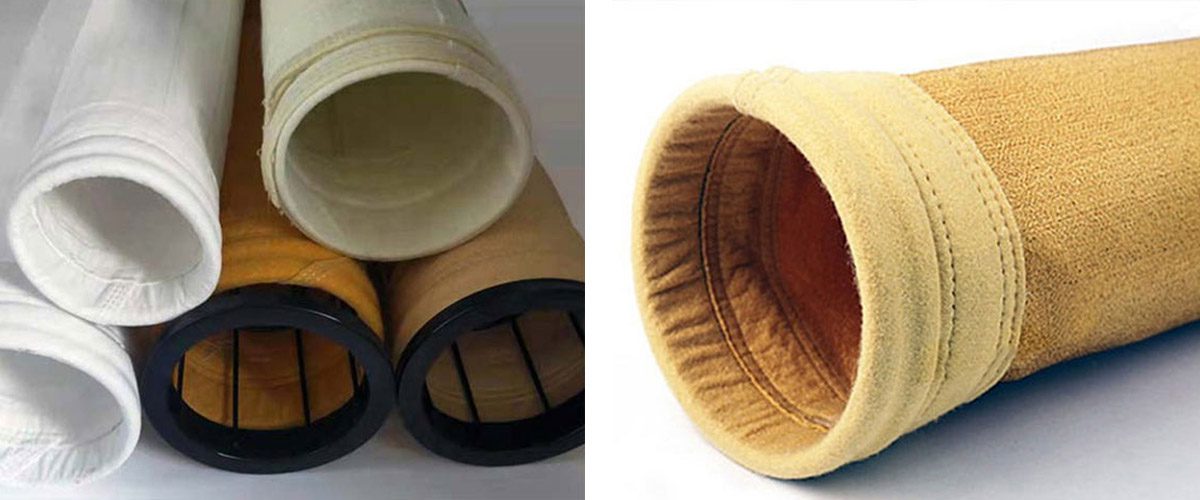As the core component of industrial dust removal system, filter bag is widely used in cement, metallurgy, electric power and other industries. However, filter bag fire accidents occur frequently, which not only causes significant economic losses, but also poses a threat to personnel safety and production continuity. This paper will systematically analyze the causes of fire, and put forward targeted prevention and control strategies.
What is a Filter Bag?
The filter bag is a gas-solid separation device made of multi-layer fiber materials, which can realize gas purification by intercepting suspended particles. Its performance directly affects the dust removal efficiency and system safety, and the key indicators such as temperature resistance and antistatic property are particularly important.

Deep analysis of the causes of fire
High temperature triggers
1. Smoke overheating operation
- Typical working conditions: Metallurgical kiln (>300 ℃), cement rotary kiln (250-350 ℃)
- Material limit:
○ polyester filter material: can continuously withstand 130-150 ℃ high temperature
○ Nomex filter material: can withstand high temperature of 204 ℃ at most
○ glass fiber filter material: up to 260 ℃ (treated with silicone oil)
- Failure mechanism: high temperature leads to the fracture of fiber molecular chain. After the strength decreases by 80%, it is easy to be ignited by sparks
2. Local overheating phenomenon
- Common triggers:
○ uneven airflow distribution (measured wind speed difference>30%)
○ ash cleaning system failure (pulse valve failure rate up to 15%)
○ poor heat exchange (the temperature difference exceeds the design value by 50 ℃)
Combustible Material Accumulation
1.Dust Spontaneous Combustion Characteristics
| Dust Type | Ignition Point (°C) | Minimum Ignition Energy (mJ) |
|---|---|---|
| Coal Dust | 160-180 | 30 |
| Aluminum Powder | 550 | 15 |
| Sulfur | 190 | 1.5 |
2. Consequences of Cleaning System Failure
Oxidation Heat Release Rate Increases by 300% when dust layer thickness exceeds 3mm.
Case Study: At a cement plant, 5mm of dust accumulation on filter bags due to solenoid valve failure triggered spontaneous combustion.
Electrostatic discharge hazards
1. Electricity generation mechanism
- The dust conveying process can generate a static voltage of 10-30kV
- Chemical fiber filter bags are prone to accumulating charges when the surface resistance is greater than 10 ¹³ Ω
2. Discharge ignition conditions
Energy>0.25mJ can ignite most industrial dust
Key prevention measures: Low MIE substances such as carbon black and magnesium powder
Equipment failure risk
1. Mechanical wear and tear
- The damage rate in the pulse blowing area accounts for 60% of the total
- Deviation of the Venturi tube by 5 ° leads to intensified airflow erosion
2. Electrical hazards
- Loose motor wiring can generate 2000 ℃ arc
- When the dust accumulation in the control cabinet reaches 0.5mm, the insulation performance decreases by 50%
Systematic prevention and control plan
Temperature monitoring system
1.Three level warning mechanism:
Level 1 warning (10% over temperature): Sound and light alarm
Level 2 warning (20% over temperature): Interlocking cooling
Level 3 warning (30% over temperature): emergency shutdown
Waste heat recovery technology:
Install GGH heat exchanger, with a cooling range of up to 150 ℃
Optimization strategy for dust cleaning
- Adopting the “pressure time” dual control mode
- Manually check the membrane after every 2000 pulses
Static elimination measures
- Implant stainless steel conductive fibers (content ≥ 5%)
- Set up ion wind static eliminator
Equipment Management Standards
- Daily inspection: Check the action status of the pulse valve
- Monthly inspection: Grounding resistance<4 Ω
- Annual overhaul: replace aging electrical components
Conclusion
By implementing these comprehensive measures, industries can significantly reduce the risk of filter bag fires, ensuring safe and stable operations. Future research should continue to explore new technologies and methods to enhance the fire resistance of filter bags and improve the safety of industrial dust handling.
For more information or inquiries, please feel free to contact us. We look forward to assisting you.

